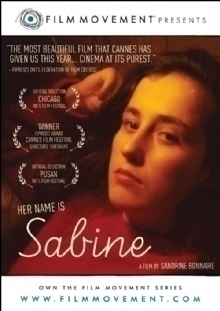
ELLE S'APPELLE SABINE (HER NAME IS SABINE)
France, 2007, 85 minutes, Colour.
Sabine Bonnaire.
Directed by Sandrine Bonnaire.
Sabine Bonnaire is the younger sister, by a year, of the French actress, Sandrine Bonnaire. As the girls were growing up, Sandrine took home movies of her sister. Some of this footage is incorporated into this film as Sandrine continues to photograph the middle-aged Sabine. How shockingly the images make their contrast. Sabine has been diagnosed as having an infantile psychology and is autistic.
We have seen a number of films over the decades dramatising autism, from Dustin Hoffman in Rain Man to Forrest Gump to Sigourney Weaver in Snow Cake. But, this portrait of Sabine is the real thing, drawing us into the real life story of Sabine, observing her, sometimes empathising with her, always puzzling over how this could happen to anyone and sharing the continual challenge of how to relate to the impaired person.
Sandrine Bonnaire herself is almost always behind the camera, only in front when she is seen dancing with Sabine in the older home movies. But she speaks from behind the camera trying to coax answers (sometimes it seems too persistently) from Sabine about what has happened to her, especially five years in an institution, and how she feels. Sabine has bonded with her sister and, in the film, asks the repetitive questions about Sandrine’s visits and whether she will come again.
The contrast, even in physical appearance, between the vivacious young adolescent and the overweight, sometimes listless, middle-aged woman is very saddening. So is her history as it gradually unfolds.
However, there are two other people in the film whose story is highlighted, a young woman prone to tantrums of joy and disruption and a thirty year old man who suffers also from epilepsy – and an interview with his mother. Sandrine’s mother and her sisters (to whom the film is dedicated) are not interviewed and do not appear.
It should be mentioned that the various carers who appear with Sabine and the others generally show an extraordinary ability to simply be with their charges and exercise a great deal of patience.
1.The impact of the film? A portrait of autism? With infantile mentality? The compassionate aspects of the film? Informative aspects?
2.The status of Sandrine Bonnaire as an actress? Her filming her sister? Over many decades? Her putting the film together, a portrait of autism for the public to understand the situation? A disability rather than a disease?
3.Sandrine Bonnaire and her filming, her voice behind the camera, her questions, glimpsing her dancing with her sister? Being with her, her sister wanting her to visit and stay? On the trip to America?
4.The filling in of the background of Sabine Bonnaire’s life, gradually and at different times during the film? As a child, as an attractive adolescent, her abilities, languages, music and the piano? The differences between her and her sisters? Her going to a normal school, her behaviour, the children criticising her, her biting and reactions? Her going to a different school? The beach scenes? The trip to America and her delight? Her gradual hospitalisation? The five years in the institution? Her gaining of weight, differences in appearance? Slow, drooling, sometimes lacking control? Her life after the institution? A home? The other autistic members of the community? Olivier and his epilepsy? The young woman and her tantrums?
5.The portrait of Sabine, the potential of what she might have been? The continued glimpses of her as an adolescent and young woman? The contrast with the older woman? The pathos? The recollections about and questions on her time in the institution? The critique? The interview with the person treating her?
6.Sabine in her thirties, alive, listless? Her weeping? Her repetitive questions to Sandrine? Her going out? The outings and shopping? At home? The piano?
7.Olivier, his age, his mother being interviewed? His epilepsy? His losing consciousness? His expectations of life? The comparison with the young woman, her autism, her tantrums, the carers taking her out of the room?
8.The portrait of the carers, their age, experience, their patience? Their staying with the people in the institution? Outings, talking, discipline?
9.The film’s insight into people with autism? As a disability? How they need to be related to, guided, handled? The infantile mentality of Sabine?
10.The work of Sandrine Bonnaire in filming her sister over the years, in interviewing her, interviewing others, editing the material together? The perspective on help for autism?